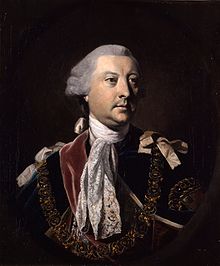George Montagu-Dunk, 2nd Earl of Halifax
|
The Right Honourable The Earl of Halifax KG PC |
|
|---|---|

The 2nd Earl of Halifax by Joshua Reynolds (1764)
|
|
| Lord Privy Seal | |
|
In office 1770–1771 |
|
| Monarch | George III |
| Prime Minister | Frederick North, Lord North |
| Preceded by | The Earl of Bristol |
| Succeeded by | The Earl of Suffolk and Berkshire |
| Lord Lieutenant of Ireland | |
|
In office 1761–1763 |
|
| Monarch | George III |
| Preceded by | The Duke of Bedford |
| Succeeded by | The Earl of Northumberland |
| President of the Board of Trade | |
|
In office 1748–1761 |
|
| Monarch | George II |
| Preceded by | The Lord Monson |
| Succeeded by | The Lord Sandys |
| Personal details | |
| Born | 6 October 1716 |
| Died | 8 June 1771 (aged 54) |
| Nationality | British |
| Political party | Tory |
| Alma mater | Trinity College, Cambridge |
George Montagu-Dunk, 2nd Earl of Halifax, KG PC (6 October 1716 – 8 June 1771) was a British statesman of the Georgian era. Due to his success in extending American commerce he became known as "father of the colonies". President of the Board of Trade 1748–61, he aided the foundation of Nova Scotia, 1749, the capital Halifax being named after him.
The son of the 1st Earl of Halifax, he was styled Viscount Sunbury until succeeding his father as 2nd Earl of Halifax in 1739. Educated at Eton College and at Trinity College, Cambridge, he was married in 1741 to Anne Richards (died 1753), who had inherited a great fortune from Sir Thomas Dunk, whose name Halifax took.
After having been an official in the household of Frederick, Prince of Wales, Lord Halifax was made Master of the Buckhounds, and in 1748 he became President of the Board of Trade. While filling this position he helped to found Halifax, the capital of Nova Scotia, which was named after him, and he helped foster trade, especially with North America.
About this time he attempted, unsuccessfully, to become a Secretary of State, but was only allowed to enter the Cabinet in 1757. In March 1761, Halifax was appointed Lord Lieutenant of Ireland, and during part of the time which he held this office he was also First Lord of the Admiralty.
He became Secretary of State for the Northern Department under Lord Bute in October 1762, switching to the Southern Department in 1763 and was one of the three ministers to whom King George III entrusted the direction of affairs during the premiership of George Grenville. In 1762, in search of evidence of sedition, he authorised a raid on the home of John Entick, declared unlawful in the case of Entick v. Carrington.
...
Wikipedia
